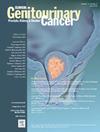铂类化疗在伴或不伴DNA损伤修复突变的前列腺癌患者中的活性
IF 2.7
3区 医学
Q3 ONCOLOGY
引用次数: 0
摘要
同源重组修复(HRR)基因的改变发生在20%-30%的转移性去势抵抗性前列腺癌(mCRPC)患者中,这可能会增加对铂化疗的敏感性。具体来说,BRCA突变患者对铂类化疗的特殊反应已被报道。本研究旨在评价铂化疗在伴有和不伴有HRR的mCRPC患者中的疗效。患者和方法:在这个多机构的回顾性系列研究中,我们分析了mCRPC患者,根据HRR改变状态评估其对含铂化疗的反应。结果测量是前列腺特异性抗原(PSA)50缓解率(PSA从基线至少下降50%的患者百分比),总生存期(OS)和无进展生存期(PFS)。结果:从1999年到2020年,24例mCRPC患者接受铂化疗,其中7例可分析PSA结果。24例患者中有19例(79.2%)的HRR发生改变,11种不同的HRR基因发生突变。HRR突变的患者在铂化疗后的PSA50缓解率为20%(1 / 5),而无HRR突变的患者为50%(1 / 2)。BRCA1/2突变患者与非BRCA1/2 HRR改变患者和无HRR改变患者相比,OS或PSA PFS无差异。结论:在mCRPC患者中,我们没有发现具有致病性HRR改变的患者与没有HRR改变的患者在接受铂类化疗后的抗肿瘤活性有统计学差异。此外,我们无法检测BRCA1/2突变状态与铂类化疗反应之间的关联。然而,无论HRR改变状态如何,铂类化疗在一部分患者中具有临床意义的活性。进一步的研究需要使用基因组数据来预测对铂类化疗的敏感性。本文章由计算机程序翻译,如有差异,请以英文原文为准。
Activity of Platinum Chemotherapy in Men With Prostate Cancer With and Without DNA Damage Repair Mutations
Introduction
Alterations in homologous recombination repair (HRR) genes occur in 20%-30% of men with metastatic castration-resistant prostate cancer (mCRPC) which may increase sensitivity to platinum chemotherapy. Specifically, exceptional responses to platinum chemotherapy have been reported among patients with BRCA mutations. This study aimed to evaluate the efficacy of platinum chemotherapy in patients with mCRPC with and without HRR.
Patient and Methods
In this retrospective, multi-institution series, we analyzed patients with mCRPC to assess response to platinum-containing chemotherapy based on HRR alteration status. Outcome measures were prostate specific antigen (PSA)50 response rate (percentage of patients achieving at least a 50% decline in PSA from baseline), overall survival (OS) and progression-free survival (PFS).
Results
From 1999 to 2020, 24 patients with mCRPC who received platinum chemotherapy were included with 7 patients analyzable for PSA outcomes. HRR alterations were found in 19 out of 24 patients (79.2%) with mutations recognized in 11 different HRR genes. Patients with a HRR alteration achieved a PSA50 response rate of 20% (1 out of 5) after platinum chemotherapy compared to 50% (1 out of 2) in patients without a HRR mutation. No difference in OS or PSA PFS was detected among patients with BRCA1/2 mutations compared to HRR alterations other than BRCA1/2 and patients without HRR alterations.
Conclusion
In patients with mCRPC, we did not find a statistical difference in anti-tumor activity after receiving platinum chemotherapy among patients harboring a pathogenic HRR alterations compared to patients without a HRR alteration. Additionally, we were unable to detect an association between BRCA1/2 mutation status and response to platinum chemotherapy. Platinum chemotherapy, however, had clinically meaningful activity in a subset of patients regardless of HRR alteration status. Additional studies are warranted using genomic data to predict sensitivity to platinum chemotherapy.
求助全文
通过发布文献求助,成功后即可免费获取论文全文。
去求助
来源期刊

Clinical genitourinary cancer
医学-泌尿学与肾脏学
CiteScore
5.20
自引率
6.20%
发文量
201
审稿时长
54 days
期刊介绍:
Clinical Genitourinary Cancer is a peer-reviewed journal that publishes original articles describing various aspects of clinical and translational research in genitourinary cancers. Clinical Genitourinary Cancer is devoted to articles on detection, diagnosis, prevention, and treatment of genitourinary cancers. The main emphasis is on recent scientific developments in all areas related to genitourinary malignancies. Specific areas of interest include clinical research and mechanistic approaches; drug sensitivity and resistance; gene and antisense therapy; pathology, markers, and prognostic indicators; chemoprevention strategies; multimodality therapy; and integration of various approaches.
 求助内容:
求助内容: 应助结果提醒方式:
应助结果提醒方式:


